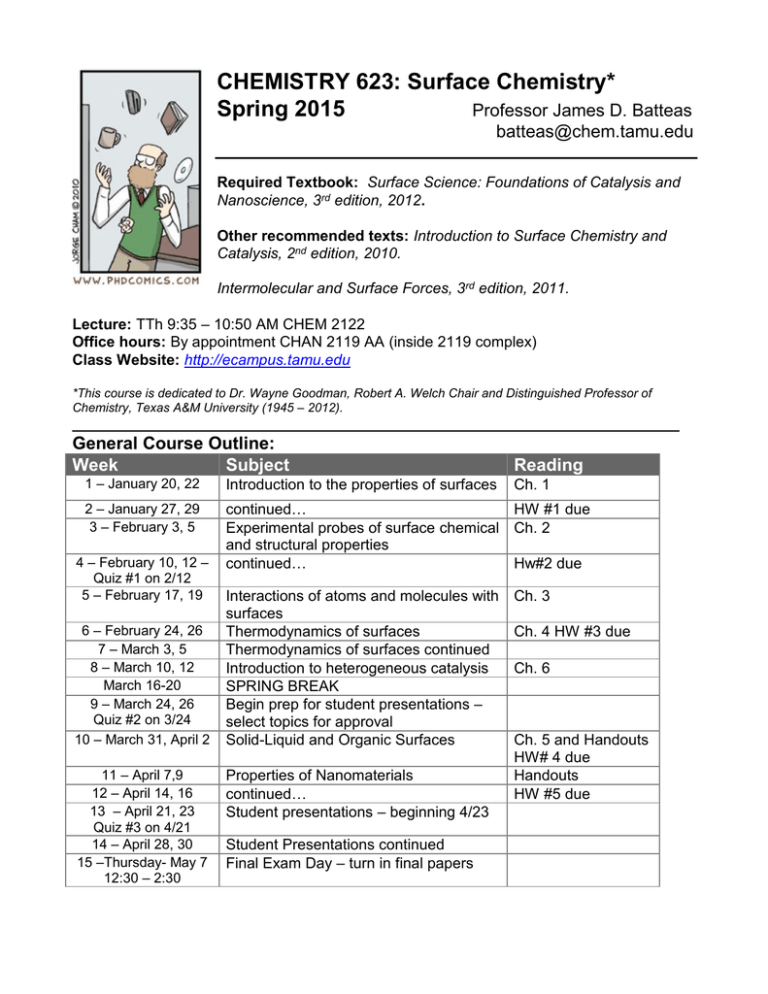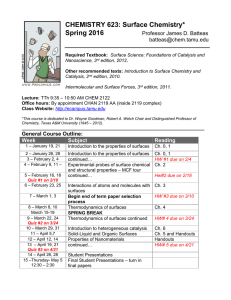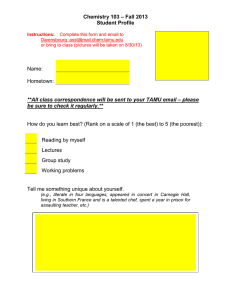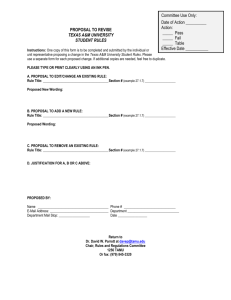CHEMISTRY 623: Surface Chemistry* Spring 2015
advertisement

CHEMISTRY 623: Surface Chemistry* Spring 2015 Professor James D. Batteas batteas@chem.tamu.edu Required Textbook: Surface Science: Foundations of Catalysis and Nanoscience, 3rd edition, 2012. Other recommended texts: Introduction to Surface Chemistry and Catalysis, 2nd edition, 2010. Intermolecular and Surface Forces, 3rd edition, 2011. Lecture: TTh 9:35 – 10:50 AM CHEM 2122 Office hours: By appointment CHAN 2119 AA (inside 2119 complex) Class Website: http://ecampus.tamu.edu *This course is dedicated to Dr. Wayne Goodman, Robert A. Welch Chair and Distinguished Professor of Chemistry, Texas A&M University (1945 – 2012). ________________________________________________________________________ General Course Outline: Week Subject Reading 1 – January 20, 22 Introduction to the properties of surfaces 2 – January 27, 29 3 – February 3, 5 continued… HW #1 due Experimental probes of surface chemical Ch. 2 and structural properties continued… Hw#2 due 4 – February 10, 12 – Quiz #1 on 2/12 5 – February 17, 19 6 – February 24, 26 7 – March 3, 5 8 – March 10, 12 March 16-20 9 – March 24, 26 Quiz #2 on 3/24 10 – March 31, April 2 11 – April 7,9 12 – April 14, 16 13 – April 21, 23 Quiz #3 on 4/21 14 – April 28, 30 15 –Thursday- May 7 12:30 – 2:30 Interactions of atoms and molecules with surfaces Thermodynamics of surfaces Thermodynamics of surfaces continued Introduction to heterogeneous catalysis SPRING BREAK Begin prep for student presentations – select topics for approval Solid-Liquid and Organic Surfaces Properties of Nanomaterials continued… Student presentations – beginning 4/23 Student Presentations continued Final Exam Day – turn in final papers Ch. 1 Ch. 3 Ch. 4 HW #3 due Ch. 6 Ch. 5 and Handouts HW# 4 due Handouts HW #5 due Learning objectives for this course: Students in this course will learn about the fundamentals of surface chemistry and the basic underlying chemistry and physics interfaces. This will include applications in areas such as heterogeneous catalysis, organic surfaces, and nanomaterials. Students will also gain an understanding of the principles behind typical modern instrumentation used for chemical and structural analysis of surfaces and interfaces. This will include developing an understanding of how the instrumentation works, their specific applications and the information that can be obtained from various of surfaces related measurements. This will include electrical and optical spectroscopic measurements as well as methods of surface structure determination. Case studies will be used to explore many of these topics. In the final 3 weeks of the term, students will also give presentations on selected topics to expand on these subjects. These presentations will be 20 minutes in length including a 5 min question/answer session. These presentations will be accompanied by a final paper describing the students selected topic. Grading Policy: Quizzes HW Student paper Presentations Grade A B C D F 30% 30% 20% 20% Percentage 85 – 100 75-84 65-74 50 – 64 < 50 The Rules: 1) Upon accepting admission to Texas A&M University, a student immediately assumes a commitment to uphold the Honor Code, to accept responsibility for learning, and to follow the philosophy and rules of the Honor System. Students will be required to state their commitment on examinations, research papers, and other academic work. Ignorance of the rules does not exclude any member of the TAMU community from the requirements or the processes of the Honor System. (aggiehonor.tamu.edu) “An Aggie does not lie, cheat, or steal or tolerate those who do.” 2) Homework and Quizzes: Homework will be assigned, collected and checked based on completion. You are responsible for checking the answers with the solutions. You will receive a grade of 0 to 100% based on the percentage completed. Doing the homework will help you be successful in this course and learn the materials. Quiz questions will be related to the various topics addressed in the class, HW questions, and seminars. 3) Excused Absences: Makeup examinations for major exams or other graded work (other than un-announced "pop" quizzes) will be given only for University-excused absences provided the appropriate documentation is provided within the time frame specified in the 2010 TAMU Rules and Regulations. Please note that Student Rule 7 (http://studentrules.tamu.edu/rule07/) regarding Attendance and Excused Absences has been modified this year. Absences of less than three days due to injury or illness will require that you provide either a physician’s note affirming the date and time of visit related to the absence or the newly established TAMU Explanatory Statement for Absence from Class form available at:https://dsacms.tamu.edu/sites/shs.tamu.edu/files/Explanatory%20Statement%20for%20A bsence%20from%20Class.pdf (copy and paste the link into your web browser) You may use this form to document excused absences of less than three days if you do not have a physician’s note but please keep in mind that the information will be verified. Any misinformation included on the form or an inability to verify the information will lead to sanctions under the Aggie Code of Honor (http://studentrules.tamu.edu/). Absences of three or more days due to illness or injury will definitely require a physician’s or other acceptable documentation. Appropriate documentation will be required for other excused absences. The university policy has an absolute deadline (by the end of the second working day after the absence) by which you must notify the professor of any excused absence. I expect you to contact me the day of the examination or before the examination if you must miss an exam for any reason. Rarely would it be impossible for you, your roommate, a friend, or parent to contact me during this time frame. Delays in notification usually raise some doubts about the validity of the excuse. Do not take this admonition lightly since some people receive zeros on exams each semester for failure to follow this University regulation. My phone (979-458-2965) has a 24-hour message service so you may leave a message (always leave a phone number where you may be reached) or talk directly to my office associate, Ms. Jennifer Belick (979-458-2958), or me. I will tell you in advance that the excuse "I couldn't get in touch with you since I was out of town" is not acceptable. If you are unable to call us then have your roommate, parents, etc. make the contact for you. You are adults and it is your responsibility to notify me within the specified time frame if you have a legitimate University-excuse for missing an exam or quiz. One day can be the difference between the opportunity to take a makeup exam and a zero! Remember, it is YOUR responsibility to contact me and to arrange for a makeup. It is not my responsibility to contact you, so simply e-mailing me asking me to contact you is not acceptable. You must keep trying to contact me to talk with me either in person or on the phone until you are successful.


